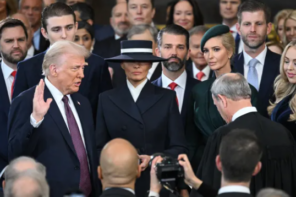
Wednesday January 8, 2025
Are the Culture Wars on Pause? How a Healthcare Tragedy Momentarily United the Left and Right
So imagine everyone’s surprise when, in the aftermath of UnitedHealthcare CEO Brian Thompson’s tragic shooting, both liberals and Trump supporters found themselves nodding—albeit for different reasons—when it came to criticising the healthcare system.
The same people who clash over everything from climate policy to pronoun usage suddenly share a collective outrage toward Big Insurance. Let’s unpack how, in an age of culture wars, one issue is capable of getting both sides to step out of their partisan echo chambers and how this shock wave could upend standard comms playbooks.
A Quick Snapshot of the Backstory
We won’t dwell too much on the specifics of the shooting itself—there are already conspiracy theories and a heated take galore. But the key point is that Luigi Mangioni, the suspected shooter, has a grab-bag of political views that don’t fit neatly into left or right boxes. He’s got strong criticisms of corporate healthcare, yet he also rails against “wokeism” and with reposts of Tucker Carlson clips.
You’ve got left-leaning liberals who see Mangioni as highlighting how predatory the insurance industry can be. Then you’ve got the pro-Trump MAGA brigade who feel like they’ve been burned by healthcare denials, too—some even sharing stories about expensive claims that never got approved. Suddenly, there’s a sense of, “Hey, maybe we do have something in common after all.”
Culture Wars: Why They Usually Dominate
Normally, you’d expect both sides to immediately blame each other whenever a major scandal or crime hits the headlines. Liberals paint the suspect as a far-right extremist; conservatives decry them as a radical leftist. It’s the same cycle we saw during the January 6 riots and the countless political events that followed in the last couple of years across the world, just reversed for whichever “side” has the microphone.
This time, that neat Us vs. Them narrative is getting scrambled. You can’t force Mangioni’s politics into a neat box. So we’re seeing unusual alliances form around the broader frustration with how the insurance system in America can often deny claims, saddle people with impossible bills, or make them jump through endless hoops to get coverage.
Despite all the polarised commentary on social media, healthcare is one area where just about everyone has a horror story. Maybe it’s the family that got bankrupted by medical bills or a friend who was denied a critical procedure. Polls after polls show that Americans are unhappy with the state of our insurance system—and that cuts across party lines.
The left finds the for-profit model exploitative to the everyday people. Why should a corporate executive get rich while patients are denied essential care?” The right, with the MAGA anti-establishment lens, says insurance is too bureaucratic, too unaccountable, and robs individuals of choice and freedom. Different rhetorics overlap into the same anger. A unique bipartisan phenomenon, far from the politics of consensus that emerged in the postwar period.
Implications for the Comms Playbook
So, what does this unusual moment of cross-partisan agreement mean for comms in this age of culture wars?
If your go-to approach has been to craft one message for a left-leaning audience and another for a right-leaning one, that probably does not work here. People are stepping outside their usual echo chambers to commiserate over health insurance nightmares. You may need more universal messaging that speaks to shared concerns—like affordability, transparency, and fairness.
Choose empathy over spin. In crisis management, a canned statement that downplays public frustration won’t cut it. Show genuine understanding for the pain people feel. Emphasise tangible steps your organisation (or client) is taking to address coverage gaps, clarify claims processes, or improve patient outcomes.
If you’re speaking on behalf of a large healthcare or insurance organisation, brace for scrutiny from both Rachel Maddow and Tucker Carlson fans. Any sign of corporate double-talk could ignite a social media firestorm that unites unlikely allies against you.
Policy communicators might find this a rare window to propose reforms that actually get buy-in from across the aisle. If left-leaning groups and Trump-supporting communities can momentarily align on healthcare, your legislative push could gain surprising momentum—if you frame it right.
Crisis Comms in a Polarised Time
The last few years have taught us that anything can become politicised in a heartbeat. But right now, healthcare frustrations seem to transcend the usual talking points. Does that mean culture wars are done? Obviously not. But it does mean you might see unusual coalitions forming around an issue that impacts every household. The old tactic would have been to pin the blame on one group but that will not cut it now.
For crisis comms teams handling any fallout—especially if you represent a healthcare company—this is a moment to lean into transparent communication. Spell out exactly how claims are evaluated, how coverage decisions are appealed, and what your organisation is doing to prevent unjust denials. If you ignore the public’s boiling frustration, you risk uniting enemies you never thought would share a picket line.
Prepare for a more nuanced media environment. Whether or not you believe Mangioni’s alleged actions are justified, the issues he ranted about hit home for people of all stripes. That’s a warning sign for anyone ignoring consumer sentiment. Mainstream outlets are dissecting the story, but everyday folks are also blowing it up on TikTok, X, and True Social. Your crisis plan should factor in both powerful channels. Politicians might sense an opening for real healthcare reform if they see their own base nodding in agreement with “the other side.” This could be a major shift—or it could fade once the next scandal hits.
It’s not every day in this day and age that you see two sides venting about the exact same root problem, let alone extending some form of understanding, however begrudgingly, toward a single controversial figure. For communications professionals, this moment underscores just how potent public grievances are—and how quickly standard left-right narratives can get scrambled by an issue that touches everyone.
So whether you’re a PR rep for a health organisation, a policy advocate aiming for reform, or a crisis manager watching the public mood, be ready to adapt. This flashpoint shows that healthcare can bring out unexpected alliances—and if your comms strategy doesn’t account for that, you risk getting blindsided by a united force you never saw coming.
Curzon PR is a London-based PR firm working with clients globally. If you have any questions, please feel free to contact our Business Development Team bd@curzonpr.com







Follow us